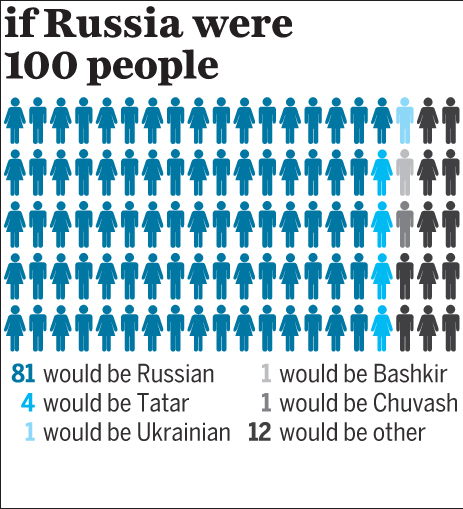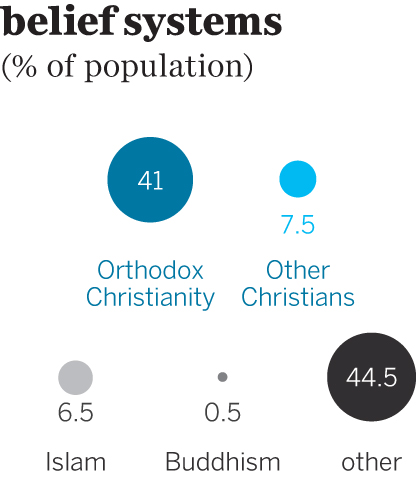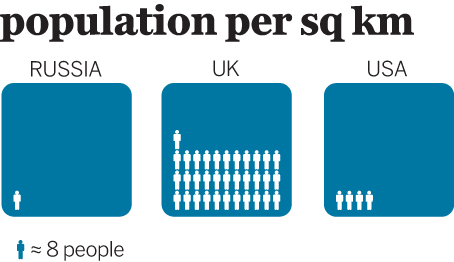Russia Today
From its relations with the US, to its key involvement in conflicts in Syria and Ukraine, Russia is resurgent on the international stage. Front and centre is President Vladimir Putin, who, should he choose to run for re-election in 2018, appears unassailable despite opposition politician Alexey Navalny nipping at his heels. Whatever happens, you can be sure that little will be allowed to spoil the success of Russia's hosting of the 2018 FIFA World Cup.
Celebrating a Revolution?
Since Putin first came to power, the Kremlin has been searching for a national ideology that could replace that of communism under the Soviet Union. In 2016 the president named patriotism as that ideology, confirming many academics’ and commentators’ suspicions that the state had, in effect, hijacked the concept to serve its own agenda (ie keeping Putin in power). Russians are actively encouraged to have a sense of pride in their history through celebrations of the country's sacrifices and victories in WWII (known in Russia as the Great Patriotic War) and glorification of historical figures such as Ivan the Terrible and Vladimir the Great, both of whom have had recent public statues unveiled in their honour.
In historical terms, 2017 is a key date for Russia, being a century since the events that led to the creation of the Soviet Union. However, it is also a tricky celebration for the Kremlin to fully embrace since its root is one of revolution – an anathema to an administration keen to avoid any similar political upheavals. You don't have to look hard to see a confused response to the Soviet period across Russia and what it means for the modern country. One wonders what the embalmed Lenin in his bunker on Red Square would think about Russia's contemporary capitalist society that now surrounds him.
Complex International Relations
With his approval rating running around 84% at home, Russia's President Putin has been emboldened to follow a more aggressive international political agenda. There's the possibility that the Russians had a hand in the election of Donald Trump to the US presidency in 2016. There's its controversial military support for Syria's President Bashar al-Assad under the guise of keeping Islamic militants in check. And there's its military backing for separatists in eastern Ukraine where, three years on from Russia's annexation of Crimea, heavy fighting continues. In response to EU sanctions imposed on Russia because of that annexation, the Kremlin imposed its own embargo on certain EU agricultural products.
Putin Can Fix It
At the time of research, Putin had yet to confirm his candidacy for the 2018 presidential election. The Kremlin is known for pulling surprises, but few believe Putin is ready to relinquish control of the nation he has effectively ruled since 2000. The 64-year-old ex-KGB agent certainly appeared in command during an annual live national TV program in June 2017, during which he answered a selection from some 2.6 million questions raised by the public. The show – which could easily be called 'Putin Can Fix It' – saw the president promise to solve problems ranging from pot-holed streets and low wages to what to do with fired FBI director James Comey (offer him asylum in Russia, like Edward Snowden).
However, one problem that Putin is somewhat at a loss of how to fix is that of a growing opposition to his rule. In a change to the program's regular format, comments from social media scrolled across the screen, a fair few of them critical of the highly orchestrated event and of Putin himself. Days prior to the TV Q&A, tens of thousands of demonstrators had gathered in over 100 cities across Russia to march against corruption and Putin's regime. Along with a thousand other people, the protest's architect and Russia's leading opposition figure Alexey Navalny was arrested and sentenced to 25 days in jail.
The Problem with Navalny
Lawyer turned anticorruption crusader Navalny has been a thorn in Putin's side since 2008, when he started blogging about state graft. The 41-year-old emerged as an effective opposition leader during the parliamentary elections of 2011, when he urged his supporters not to vote for United Russia, which he dubbed the 'party of crooks and thieves'. Standing as a candidate in the Moscow mayoral elections of 2013, Navalny captured 27% of the vote despite a concerted attempt by the establishment to sideline him.
In the latest of several criminal prosecutions against him, Navalny was convicted of embezzlement in 2014. He claims this verdict, like those before it, is politically motivated; candidates with a criminal record are barred from standing for the presidency. Nevertheless, Navalny is determined to run, and has began campaigning across the country, taking his message as far afield as Siberia. Barred from national TV, Navalny – for all his team's internet and social media savvy – has a mountain to climb. Less than 50% of Russians know who he is, according to independent pollsters the Levada Center. Those that do know him are also likely to be aware of his strong nationalist views, which come with an unrepentant tinge of antimigrant rhetoric. This makes him a controversial figure that not all Russian liberals are in a hurry to support.
2018 World Cup
In June 2017 Russia held the Confederation Cup, a dress rehearsal for the FIFA 2018 World Cup. Antidiscrimination observers were present at all matches and referees had the chance to halt games if fans’ abuse didn't cease after warnings. Russia is the first country in Eastern Europe to host the globe's most prestigious soccer championship, and national honour (not to mention Putin's reputation) is riding on the tournament's success. As with the 2014 Winter Olympics in Sochi, the chances of anything not going according to script is slim.
Transport upgrades including improved and new airports (Samara’s Kurumoch International Airport, for example), better roads and speedier rail links are making it easier for travellers and football fans to get around Russia. However, the ongoing economic slowdown, mainly caused by the drop in crude oil prices, has caused the initial budget for improved infrastructure to be slashed by almost threefold to US$10 billion.
With a year to go, at the time of writing only five out of the 12 stadiums in 11 locations (Moscow, St Petersburg, Kaliningrad, Kazan, Nizhny Novgorod, Samara, Saransk, Rostov-on-Don, Sochi, Volgograd and Yekaterinburg) have been completed. Human Rights Watch have documented abuses at six stadium construction sites, including unpaid wages and hazardous working conditions that have led to deaths. This includes the decade-overdue Krestovsky Stadium in St Petersburg, where the budget has ballooned to as much as US$1.5 billion (the government claims US$700 million).
Best on Film
Loveless (2017) Winner of the Jury Prize at the Cannes Film Festival in 2017, Andrei Zvyagintsev's follow-up to Leviathan is another subtle critique of contemporary Russian society.
My Perestroika (2010) Robin Hessman’s film focuses on five Russians and the effect of the past 20 turbulent years on their lives.
Bolshoi Babylon (2015) Behind-the-scenes documentary exposing the violent rivalries in Russia's most famous ballet troupe.
Best in Print
Nothing Is True and Everything Is Possible: Adventures in Modern Russia (Peter Pomerantsev; 2014) Darkly entertaining tales of contemporary Russian life by TV producer Peter Pomerantsev.
The Last Man in Russia (Oliver Bullough; 2013) A spot-on portrait of modern Russia, told through the tumultuous and tragic life of an Orthodox priest.
Lost Cosmonaut and Strange Telescopes (Daniel Kalder; 2006 and 2009) Kalder’s books explore some of Russia’s quirkiest and least-visited locations.
Best on the Internet
Calvert Journal (www.calvertjournal.com) Best online guide to the creative and progressive side of Russia.
Russia! (http://readrussia.com) Sparky cultural and political features on all things Russian.
Russia in Global Affairs (http://eng.globalaffairs.ru) Features relating to Russian politics, economy and culture.
Russia Beyond the Headlines (www.rbth.com) News, views and cultural features.
Best Fiction
The Patriots (Sana Krasikov; 2017) An emotionally wrenching, multigenerational drama covering much of Russia's 20th- and early-21st-century history.
Day of the Oprichnik (Vladimir Sorokin; 2011) Dystopian drama set in Moscow in 2028 by one of Russia's most popular modern writers.
The Master and Margarita (Mikhail Bulgakov; 1967) A satirical masterpiece completed in 1940 just before the author's death.
Snowdrops (AD Miller; 2011) An edgy morality tale set in contemporary Russia.
Best in Music
Leningrad (http://leningrad.top) Punk rock, Latino, polka and Tom Waits with a strong brass section.
The Jack Wood (http://thejackwood.com) Garage-protopunk-blues band from Tomsk in Siberia.
Deti Picasso (www.myspace.com/detipicasso) Armenian-Russian folk-rock band from Moscow.
Alai Oli (http://alai-oli.com) Reggae band fronted by dreadlocked singer-songwriter Olga Markes.
Leonid Fedorov (www.leonidfedorov.ru) Semi-absurd poetry fused with acoustic guitars and hypnotic melodies.
Population
144.5 million
Area
17,098,242 sq km
GDP
US$1.326 trillion
Inflation
4.1%


